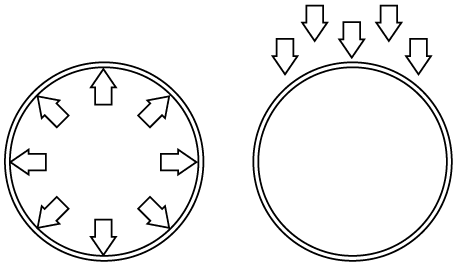Maximum Depths of Cover for Minimum Pressure Classes
Ductile Iron Pipe ANSI/AWWA C151/A21.51

This table tabulates the maximum depth of cover for the five types of laying conditions, along with corresponding nominal wall thickness and maximum rated working pressure, all for minimum pressure classes of ductile iron pipe. Taken from the table that follows, it is offered as a convenience for quickly checking the capabilities of minimum pressure classes of ductile iron pipe under a given set of conditions.
For the majority of internal pressure and external loading conditions, minimum pressure classes are more than adequate and possess substantial safety factors.
| Size (in.) |
Pressure Class |
Thickness (in.) |
Laying Conditions Maximum Depth of Cover in Feet1 |
||||
|---|---|---|---|---|---|---|---|
| Type 1 | Type 2 | Type 3 | Type 4 | Type 5 | |||
| 4 | 350 | 0.25 | 53 | 61 | 69 | 85 | 1004 |
| 6 | 350 | 0.25 | 26 | 31 | 37 | 47 | 65 |
| 8 | 350 | 0.25 | 16 | 20 | 25 | 34 | 50 |
| 10 | 350 | 0.26 | 112 | 15 | 19 | 28 | 45 |
| 12 | 350 | 0.28 | 102 | 15 | 19 | 28 | 44 |
| 14 | 250 | 0.28 | see3 | 112 | 15 | 23 | 36 |
| 16 | 250 | 0.3 | see3 | 112 | 15 | 24 | 34 |
| 18 | 250 | 0.31 | see3 | 102 | 14 | 22 | 31 |
| 20 | 250 | 0.33 | see3 | 10 | 14 | 22 | 30 |
| 24 | 200 | 0.33 | see3 | 82 | 12 | 17 | 25 |
| 30 | 150 | 0.34 | see3 | - | 9 | 14 | 22 |
| 36 | 150 | 0.38 | see3 | - | 9 | 14 | 21 |
| 42 | 150 | 0.41 | see3 | - | 9 | 13 | 20 |
| 48 | 150 | 0.46 | see3 | - | 9 | 13 | 20 |
| 54 | 150 | 0.51 | see3 | - | 9 | 13 | 20 |
| 60 | 150 | 0.54 | see3 | 52 | 9 | 13 | 20 |
| 64 | 150 | 0.56 | see3 | 52 | 9 | 13 | 20 |
1) These pipes are adequate for the rated working pressure indicated for each nominal size plus a surge allowance of 100 psi. Calculations are based on a 2.0 safety factor times the sum of working pressure and 100 psi surge allowance. Ductile iron pipe for working pressures higher than 350 psi is available.
2) An allowance for a single H-20 truck with 1.5 impact factor is included for all sizes and all depths of cover.
3) Minimum allowable depth of cover is 3’. For depths less than 3’, consult AMERICAN.
4) Calculated maximum depth of cover exceeds 100’.
5) Laying condition Type 1 is limited to 12" and smaller pipe. For 14" and larger pipe, laying condition Type 1 should not be used.
For other conditions not covered in these tables see AWWA C150 or consult AMERICAN for design of pipe thickness. Special thickness classes may be appropriate in such cases.